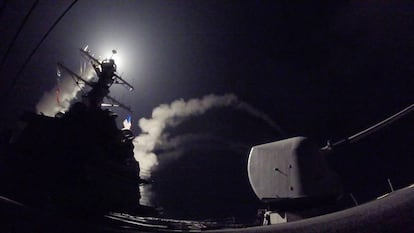The Spanish–US defense agreement in the era of Donald Trump
The use of destroyers based in Rota, in southern Spain, to attack the Syrian regime sets a worrying precedent
A defense agreement signed between Spain and the United States in 1988, amended in 2002, 2012 and 2015, and currently in effect until May 2021, grants the US military support facilities in Rota and Morón, a naval and air base respectively in the south of Spain, and authorizes the use of Spanish land, sea and airspace, both on a bilateral basis and within the framework of NATO. “Any use that goes beyond these objectives,” warns article 2.2 of the agreement, “will require the prior authorization of the Spanish government.”

The USS Ross and the USS Porter – the US naval vessels that fired 59 Tomahawk missiles against a Syrian airbase last Friday in response to a chemical attack reportedly carried out by the forces of President Bashar al-Assad – have been operating out of Rota since June 2014 and 2015 respectively. The agreement that authorized the deployment of these two ships states that the objective is to “contribute significantly to the [NATO] system against ballistic missiles,” and the use of the Spanish base is granted “in compliance with the [defense] agreement.”
The USS Porter set sail from Rota on March 7, while the USS Ross left on April 3, before the chemical attack on the Syrian locality of Idlib took place – the attack that set in motion the response by US President Donald Trump. The Pentagon could not give advance warning about the mission that the destroyers were going to carry out when they left Spanish waters, but they did once it was ordered.
The Spanish government has admitted that it was not informed of the attack in advance
But the Spanish government has admitted that it was not informed of the attack in advance, in contrast to the countries that are participating in the air campaign against the so-called Islamic State (ISIS) in Syria (France, United Kingdom, Holland and Denmark, as well as Russia). The US ambassador to NATO sent a letter to his allied counterparts, which was received and read on Friday morning, once news of the missile raid had already hit the headlines.
Hours later, the Spanish government sent out a statement in which it described the firing of the missiles as a “measured and proportionate response to the use by the Syrian army of chemical weapons.” However, the statement signed by seven leaders from southern Europe, including Spanish Prime Minister Mariano Rajoy, avoided expressly blaming al-Assad for the massacre in Idlib, pointing out that both Damascus and ISIS have used chemical weapons, and calling for “all of the identified culprits” to be held accountable for the war crime.
Until now, no independent investigation has established who was to blame for the attack, but even if this were the case in a future incident of a similar kind, that would not legitimize after the fact an operation that was carried out both on the margins of international law and the agreement approved by the Spanish government.
The Spanish government expressed its concern that the Russians’ veto has blocked the intervention of the United Nations Security Council in the Syrian conflict. Indeed, this is the kind of dysfunctional world order that is currently in place. It’s quite another thing to take justice into your own hands. That is what Trump has done. But will this be the last time?
Tu suscripción se está usando en otro dispositivo
¿Quieres añadir otro usuario a tu suscripción?
Si continúas leyendo en este dispositivo, no se podrá leer en el otro.
FlechaTu suscripción se está usando en otro dispositivo y solo puedes acceder a EL PAÍS desde un dispositivo a la vez.
Si quieres compartir tu cuenta, cambia tu suscripción a la modalidad Premium, así podrás añadir otro usuario. Cada uno accederá con su propia cuenta de email, lo que os permitirá personalizar vuestra experiencia en EL PAÍS.
¿Tienes una suscripción de empresa? Accede aquí para contratar más cuentas.
En el caso de no saber quién está usando tu cuenta, te recomendamos cambiar tu contraseña aquí.
Si decides continuar compartiendo tu cuenta, este mensaje se mostrará en tu dispositivo y en el de la otra persona que está usando tu cuenta de forma indefinida, afectando a tu experiencia de lectura. Puedes consultar aquí los términos y condiciones de la suscripción digital.









































